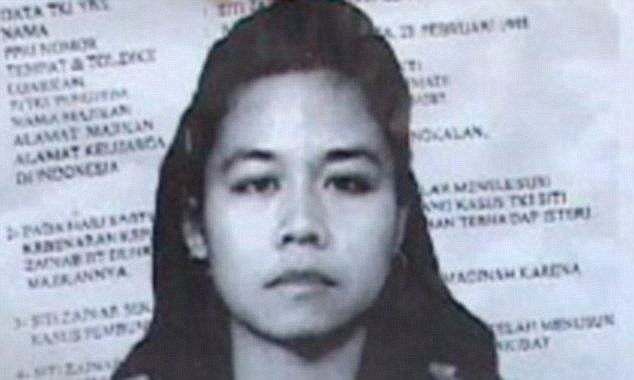Saudi Arabia has been condemned for beheading an Indonesian domestic worker who was 'suffering from mental illness'.
Her home country's leadership is furious that Siti Zainab's family was not notified before her execution this morning - and summoned Saudi Arabia's ambassador to complain about her death.
While Amnesty International says her killing in the holy Islamic city of Media this morning 'smacks of a basic lack of humanity'.
The domestic worker was sentenced to death in 1999 after confessing to stabbing her employer who allegedly mistreated her to death.
She was on death row for over 15 years while Saudi Arabian authorities waited for the victim's youngest child to reach adulthood - to decide whether or not the family wanted to pardon Zainab or demand her execution.
Indonesian President Joko Widodo and three of his predecessors had previously written to the Saudi king asking for the victim's family to forgive Zainab.
But the sentence was carried out despite their claims that Zainab's family and officials were not given adequate notice or information before she was killed.
Indonesia's foreign ministry released a statement saying: 'From the beginning, the government has struggled to provide her with assistance and has asked the family [of the victim] for forgiveness.
'The Indonesian government filed a protest against the Saudi Arabian government for not giving prior notification to Indonesian representatives or to the family over the execution date.'
Riyadh's ambassador to Indonesia was 'surprised' to be summoned by the foreign ministry but said he would follow up on Jakarta's concerns.
Mustafa Ibrahim Al-Mubarak said: 'The problem is not about the court and the execution, it is about the date of the execution... I have to check what went wrong.'
Before her arrest, Zainab sent two separate letters to her employer's son to say the woman she eventually killed had been cruel to her.
The Indonesian government has issued a statement condemning Saudi Arabian authorities' failure to notify them and Zainab's family before executing her.
A UN resolution has urged states not to execute or impose the death penalty 'on a person suffering from any form of mental disorder'.
'Imposing the death penalty and executing someone with a suspected mental illness smacks of a basic lack of humanity,' according to Amnestry International's Middle East and North Africa Programme Director.
Philip Luther added: 'This practice has been widely condemned on the world stage and Saudi Arabia should take this opportunity to reconsider its stance on the death penalty.'
She had no legal representation at any stage and did not have access to a consular representative during the police interrogation when she had made her 'confession', according to Amnesty.
They claim the police knew she suffered from mental illness at the time of the interrogation.
The charity's 2014 global report on the death penalty released earlier this month said Saudi Arabia once again ranks among the top five executioners in the world.
So far in 2015, Saudi Arabia has executed at least 60 people, most of them by beheading which compares to 90 executions in the entirety of 2014.
Philip Luther added: 'Whatever the misguided purpose behind Saudi Arabia's shocking spike in executions so far this year, it should draw international condemnation.
'The Kingdom's authorities must halt this execution spree and establish an official moratorium on the use of the death penalty.'
Human rights groups are using Zainab's beheading to urge Indonesia to abandon its support for the death penalty as it presses ahead with plans to execute several foreigners on death row for drug crimes.
But Jakarta remains determined to execute several drug traffickers - including citizens from Australia, France, Nigeria, Ghana, Brazil and the Philippines - as soon as possible.
(dailymail.co.uk)
ANN.Az
www.ann.az
Follow us !











